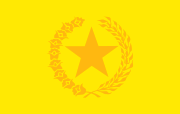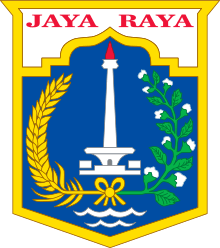Joko Widodo
| Joko Widodo | |
|---|---|
 | |
| 7th President of Indonesia | |
|
Assumed office 20 October 2014 | |
| Vice President | Jusuf Kalla |
| Preceded by | Susilo Bambang Yudhoyono |
| 14th Governor of Jakarta | |
|
In office 15 October 2012 – 16 October 2014 | |
| Deputy | Basuki Tjahaja Purnama |
| Preceded by | Fauzi Bowo |
| Succeeded by | Basuki Tjahaja Purnama |
| 15th Mayor of Surakarta | |
|
In office 28 July 2005 – 1 October 2012 | |
| Deputy | F. X. Hadi Rudyatmo |
| Preceded by | Slamet Suryanto |
| Succeeded by | F. X. Hadi Rudyatmo |
| Personal details | |
| Born |
Mulyono 21 June 1961 Surakarta, Indonesia |
| Political party | PDI-P |
| Spouse(s) | |
| Children |
Gibran Rakabuming Raka Kahiyang Ayu Kaesang Pangarep |
| Mother | Sujiatmi |
| Father | Notomiharjo |
| Residence | Bogor Palace |
| Alma mater | Gadjah Mada University |
| Signature |
|
| Website | Presidential website |
| ||
|---|---|---|
|
Pre-presidency President of Indonesia Policy Summits Family
 |
||
Joko Widodo (born Mulyono;[1] 21 June 1961), also known as Jokowi, is an Indonesian politician who is the seventh and current President of Indonesia. Elected in July 2014 as the first Indonesian president to not come from an elite political or military background, he was previously the Mayor of Surakarta from 2005 to 2012, and the Governor of Jakarta from 2012 to 2014.
He achieved national prominence in 2009 for his work as the Mayor of Surakarta. A member of the Indonesian Democratic Party of Struggle (PDI-P), he was its candidate for the 2012 Jakarta gubernatorial election, alongside Basuki Tjahaja Purnama (often known as Ahok)[2] as his running mate.[3] Defeating incumbent Fauzi Bowo[4], he took office in October 2012 and reinvigorated Jakarta politics, with publicized blusukan visits (unannounced spot checks)[5] and improving the city's bureaucracy, reducing corruption in the process. He also introduced years-late programs to improve quality of life in the city, including universal health-care, dredging the city's main river to reduce flooding, and inaugurating construction of the city's subway system.[6]
Seen as a rising star in Indonesian politics, PDI-P nominated Jokowi for the 2014 presidential election.[7] Winning a majority of the popular vote, he was named president-elect on 22 July 2014, to bitter protest from his rival Prabowo Subianto, who disputed the outcome and withdrew from the race before the count was completed.[8][9]
As president, Jokowi has primarily focused on infrastructure, introducing or restarting long-delayed programs to build highways, high-speed rail, airports and other facilities to improve connectivity in the Indonesian archipelago.[10] After a lengthy public debate and pushback, Jokowi signed into law the Indonesian tax amnesty bill, giving wealthy Indonesians a chance to declare their unreported assets before the government would strengthen rules and oversight around imports and exports. It became the most successful program of its kind in history,[11] with over Rp. 4,865 trillion (approximately $366 billion USD)[12] of previously unreported assets declared to the tax office. On foreign policy, his administration has placed an emphasis on "protecting Indonesia’s sovereignty",[13] with the sinking of illegal foreign fishing vessels[14] and the prescription of capital punishment for drug smugglers, despite intense pressure from foreign powers including Australia and France.[15][16] After four years in office, Jokowi's approval ratings remain high, in the high-60s to low-70s. He will seek re-election in 2019.[17]
Early life and career
Joko Widodo was born Mulyono on 21 June 1961, and is of Javanese descent.[1] He is the eldest of four siblings and is the only son of Noto Mihardjo (father) and Sudjiatmi Notomihardjo (mother). He has three younger sisters, named Iit Sriyantini, Ida Yati and Titik Relawati.[18][19] His father came from Karanganyar, while his grandparents came from a village in Boyolali.[20] At the age of 12, he started working in his father's furniture workshop.[21][22] The evictions he experienced three times in his childhood affected his way of thinking - and his leadership later on as the mayor of Surakarta (Solo) - as he organised housing in the city.[23]
Education and entrepreneurial career
His education began in State Elementary School 111 Tirtoyoso, known for being a school for less wealthy citizens.[24] He continued his studies in State Junior High School 1 Surakarta.[25] He had wanted to continue his education in State Senior High School 1 Surakarta but failed the entrance exam and went to State Senior High School 6 Surakarta instead.[26] Jokowi graduated from the Forestry faculty at Gadjah Mada University, Yogyakarta, in 1985 where his work included studies and research on the use of plywood. He later began work at PT Kertas Kraft Aceh, a state-owned firm in the province of Aceh.[27] He worked there between 1986 and 1988, as a supervisor of forestry and raw materials.[28]
Jokowi, however, soon became uninterested in his activities in the firm and returned home. He then began working in his grandfather's furniture factory for a year before establishing his own company, Rakabu, whose namesake is his first child. The company, which mainly focused on teak furniture, nearly went bankrupt at one point, but survived following a Rp 500 million loan from Perusahaan Gas Negara. By 1991, the company began exporting its products and they were successful in international markets. They were sold, for example, in France where they first established a presence in the European market. It was a French customer named Bernard who gave Joko Widodo the nickname he is famous for, 'Jokowi'.[27][29][30]
By 2002, Jokowi had become the chairman of Surakarta's furniture manufacturers association.[30] Ultimately he decided to become a politician and promote reform in his home town, Surakarta, after seeing the neat layouts of some European cities while promoting his furniture there.[22] After becoming mayor, he also made a joint venture with politician and former lieutenant general Luhut Binsar Pandjaitan, when the two founded PT Rakabu Sejahtera (from Rakabu and Luhut's PT Toba Sejahtera).[31][32]
Political career
Mayor of Surakarta
After first joining PDI-P in 2004, Jokowi ran in the mayoral race in Surakarta in 2005 with F. X. Hadi Rudyatmo as his running mate, with the support of PDI-P and the National Awakening Party.[33][34] The pair won 36.62% of the vote against the incumbent Slamet Suryanto and two other candidates. When Jokowi first ran for the office of mayor, his background as a property and furniture businessman was questioned. One academic paper claimed his leadership style was successful because it established an interactive relationship with the people of Solo, through which he was able to induce people's strong faith in him.[35] He adopted the development framework of European cities (which he frequently traveled to as a businessman) as a guide for changes in Surakarta.[36]
Jokowi's policies during the seven years that he was mayor of Surakarta included:[37]
- Building new traditional markets & renovating existing markets
- Constructing a 7-km city walk with a 3-meter wide pedestrian walkway along Surakarta's main street
- Revitalizing the Balekambang and Sriwedari parks
- Stricter regulations on cutting down trees along the city's main streets
- Rebranding Surakarta as a center of Javanese culture and tourism under the tagline 'The Spirit of Java'
- Promoting the city as a center for meetings, incentives, conventions and exhibitions (MICE)
- The blusukan culture, the manner in which Jokowi made impromptu visits to certain areas to listen to people's issues
- Prohibiting his family members from bidding for city projects, therefore suppressing risk of corruption
- Healthcare & education insurance program for all residents
- A local bus rapid transit system named Batik Solo Trans
- Solo Techno Park, which helped support the Esemka Indonesian car project[38]
His supporters pointed to rapid positive changes in Surakarta under his leadership and the branding the city with the motto 'Solo: The Spirit of Java'. While in office he successfully relocated antique stalls in the Banjarsari Gardens without incident, a helpful move in revitalizing the functions of the open green land; he emphasized the importance of business firms engaging in community activities; he improved communications with the local community by appearing regularly on local television. As a follow-up of the new branding of Surakarta, he applied for Surakarta to become a member of the Organization of World Heritage Cities, which was approved in 2006, and subsequently had Surakarta chosen to host the organization's conference in October 2008. In 2007, Surakarta had also hosted the World Music Festival (Festival Musik Dunia/FMD) which was held at the complex of Fort Vastenburg near the centre of the city. The FMD in 2008 was held in the Mangkunegaran Palace Complex.
Part of Jokowi's personal style was his populist 'can-do' (punya gaye) elements designed to build bonds with the broad electorate.[35] As mayor of Surakarta, he became personally involved in an incident just before Christmas 2011 when the Surakarta municipality had overdue bills of close to $1 million (Rp 8.9 billion) owed to the state-owned electricity company Perusahaan Listrik Negara (PLN). Following the electric company's policy of pursuing a more disciplined approach to collecting overdue bills, it imposed a blackout on street lights in Surakarta just before Christmas. The city government quickly authorized payment but in settling the bill protested that the PLN should consider the public interest before taking this type of action. To reinforce the point, Jokowi made a highly publicized personal visit to the local PLN office to deliver the Rp 8.9 billion in cash in the form of hundreds of bundles of notes and even small coins.[39]
In 2010, he was reelected for his second term, once more running with Hadi. The incumbent pair won 90.09 percent of the votes - losing in only a single polling station.[40] Jokowi was chosen as the 'Tempo Leader of Choice' by Tempo news magazine (2008) and received a 'Changemakers Award' from Republika newspaper (2010); his name also started being considered in national polls for governorship of Jakarta long before his party nomination of him to run for the post, including those by Universitas Indonesia and Cyrus Network (2011).[35]
Governor of Jakarta
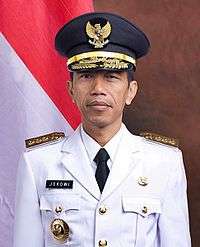
Jokowi won the 2012 gubernatorial election in Jakarta after a runoff round against incumbent Fauzi Bowo.[4] His inner circle of advisers in Jakarta was reported to include people such as FX Hadi 'Rudy' Rudyatmo, Sumartono Hadinoto, and Anggit Nugroho who were colleagues while he was mayor of Surakarta as well as Ahok, his deputy as governor of Jakarta.[41] Jokowi continued the blusukan practice he had adopted as mayor of Surakarta by regularly visiting population centres, especially slums. During these visits, he wore simple informal clothes and stopped at markets or walked along narrow Jakarta alleys to listen and witness firsthand about issues addressed by local residents such as the price of food, housing difficulties, flooding, and transportation. Polling and media coverage suggested that Jokowi's hands-on style proved very popular both in Jakarta and elsewhere across Indonesia.[42]
On April and June 2013, Jokowi began implementing a system of bureaucratic recruitment called lelang jabatan (literally 'auction of office position'). This system, which was previously unknown in Indonesia and is similar to policies of advancement on merit common for Indonesia's foreign aid donor countries,[43] meant that every civil servant had the same opportunity to achieve a certain position by fulfilling the required qualifications. The test results were announced transparently and the provincial government appointed qualified civil servants in accordance with their achievements and qualifications.[44]
In June 2013, a film titled Jokowi, depicting Widodo's childhood and youth, was released.[45] Widodo expressed some objections to the film saying that he felt his life had been a simple one and was not worthy of being adapted into a film.[46]
Healthcare and education
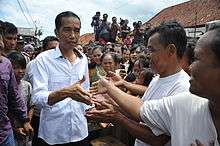
Shortly after taking office, Jokowi introduced a universal health care program, the 'Healthy Jakarta Card' (Kartu Jakarta Sehat, KJS). It proved to be popular but there were implementation problems.[47] The demand for health services from hospitals across Jakarta rose by 70% in the first few months.[48] KJS involved an insurance program provided through the state-owned insurance company PT Askes Indonesia (Persero) and a plan to regulate health charges for treatment for over 20,000 services and procedures.[49] There was confusion over the details of the implementation of the system and long queues for services caused dissatisfaction. The long queues even generated a market for middlemen who offered line-waiting services for up to Rp 150,000 (around $US 15 at end-2013 exchange rates).[50] The various problems led to criticism of Jokowi in the Jakarta regional parliament that he was promoting a populist, poorly-designed program. However Jokowi defended KJS and counseled patience. In education, Jokowi launched 'Smart Jakarta Card' (Kartu Jakarta Pintar, KJP) on 1 December 2012, in order to help poor students in Jakarta. It gives an allowance that can be withdrawn from ATMs in order to buy school needs such as books and uniforms. The usage of the card is constantly monitored and is not allowed to be used for other purposes.[51]
Finance and transparency
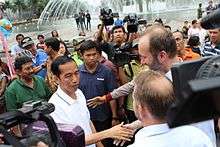
After Jokowi took office, taxes and the provincial budget of Jakarta increased significantly from Rp 41 trillion in 2012 to Rp 72 trillion in 2014.[52][53] Both Jokowi and Ahok publicized their monthly salary and the provincial budget.[54][55] They also initiated programs aimed towards transparency, such as online taxes, e-budgeting, e-purchasing, and a cash management system.[54] Moreover, all meetings and activities that were attended by Jokowi and Ahok were recorded and uploaded on YouTube.[56]
Other policies
Jokowi regulated the chaotic agglomeration of street vendors in Pasar Minggu and Pasar Tanah Abang by relocating them to a new building, as they were causing traffic jams.[57] He also built and renovated five traditional markets in 2013 and four in 2014.[58][59] The vendors in these markets are not charged for rent, although they are required to maintain their kiosks and not sell them. They are only asked to pay for maintenance, electricity, and water costs.[60]
In 2013, Jokowi initiated dredging and reservoir normalization projects in order to reduce the flooding problem. Three of the most notable projects were the normalization of Pluit Reservoir, Ria Rio Reservoir, and Pesanggrahan River. These projects involved the relocation of settlements around the reservoirs, in which Jokowi used the 'lunch diplomacy' tactic to obtain agreement from the local populace.[61] After the inhabitants of these settlements were moved to a new location, the dredging commenced and the project was praised by the Prime Minister of the Netherlands Mark Rutte as successful.[62] These projects helped to reduce the extent of flooding in 2014.[63]
On 10 October 2013, Jokowi inaugurated the construction of the Jakarta MRT, which was previously delayed for years.[64] Subsequently, less than a week later, Jokowi also restarted the construction of the green line of the Jakarta Monorail,[65] although finally it was disbanded in favour of the Jakarta LRT.[66]
Presidential candidacy
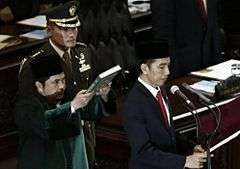
Megawati Sukarnoputri chose Jokowi to be the presidential candidate of her party.
After hearing the Quick Count results of many different polls, Jokowi declared victory on 9 July. However, his rival Prabowo Subianto also declared victory, leaving Indonesian citizens confused.[67] On 22 July, hours before the announcement of the election results, Prabowo withdrew.[68] A victory for Jokowi was expected[69] and realized hours later.[68] The Commission gave Joko Widodo a close victory of 53.15 percent of the vote (representing 70,997,859 voters), to Prabowo's 46.85 percent (62,576,444 votes),[70] though Prabowo's camp disputed these totals.[71]
After his victory, Jokowi stated that, growing up under the authoritarian and corrupt New Order regime, he would have never expected someone with a lower-class background to become president. The New York Times reported him as saying "now, it's quite similar to America, yeah? There is the American dream, and here we have the Indonesian dream".[72] Jokowi was the first Indonesian president to not come from the military or the political elite, and the political commentator Salim Said gave the popular view of the politician as "someone who is our neighbor, who decided to get into politics and run for president".[72]
President of Indonesia
Cabinet
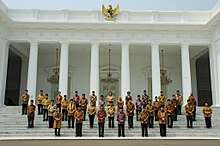
Jokowi announced the 34 names in his cabinet on 26 October 2014.[73] While the cabinet was praised for inclusiveness of women, with Retno Marsudi becoming Indonesia's first female foreign minister, it received criticism for several perceived political inclusions such as Puan Maharani (daughter of Megawati Sukarnoputri).[74] Widodo's presidency also saw the formation of two new ministries (Ministry of Public Works and Housing and Ministry of Environment and Forestry) from merger of old ministries, in addition to renaming and reorganization of other ministries.[75]
In total, he conducted three cabinet reshuffles until 2018, removing ministers such as Rizal Ramli and Bambang Brodjonegoro while including ministers such as Luhut Binsar Pandjaitan and World Bank Director Sri Mulyani Indrawati.[76]
Economy
In the first quarter of 2015, year-on-year GDP grew 4.92 percent.[77] In the second quarter it grew 4.6%, the lowest figure since 2009.[78] Anything less than 6 per cent and Indonesia cannot absorb the new entrants to its labour market each year.[79] Furthermore since most of 2017 economic growth remained above the 5.2 percent mark, the Indonesian government has projected its economic growth in 2018 to be at least at 5.4 percent, which is still .6 percent below what is considered healthy economic growth mark of 6 percent.[80] The Indonesian rupiah has also weakened, with its exchange rate per US dollar, falling to Rp 14,000 in August 2015, the lowest level in the last 17 years.[81] On 24 September 2015, it closed at 14797.[82] The rupiah appreciated by 2.28 percent to Rp13.473/USD on 31 December 2016.[83] In May 2018, the currency once more passed the 14,000 mark,[84] briefly passing the 15,000 mark in September before lowering back.[85] The year-on-year inflation in June 2015 was 7.26 percent, higher than in May (7.15 percent) and June the year before (6.7 percent).[86]
Prior to taking office Jokowi sought for outgoing President Yudhoyono to take responsibility for the decision to further increase fuel prices[87] by further removing subsidies.[88] Previous attempts by his predecessor to reduce subsidies had resulted in civil unrest.[87] On 1 January 2015, Jokowi took measures which on the surface appeared to reduce fuel subsidies that have been applauded by the International Monetary Fund.[89] The government implemented a fixed diesel subsidy of 1,000 rupiah ($0.08) a liter, while the subsidies for gasoline were reduced or scrapped.[90] The policy stirred up some demonstrations in several places across Indonesia, with Jokowi citing it as necessary to increase funding for the infrastructure, education and health sectors.[91] However, since March 2015, the government has set the price of Premium-branded gasoline far below the market price causing the fuel subsidy to be incurred by state-owned oil company Pertamina instead of the direct government account.[92] In addition, the government also implemented a single-price program, aiming to sell fuel through official channels at the same price nationally including in isolated parts of Kalimantan and Papua. The government claimed that this was achieved in 2017.[93]
Jokowi has vowed to develop and upgrade Indonesia's infrastructure, with a focus on road and railway expansion, seaports and airports development, and irrigation. In 2016, the state budget allocated Rp 290 trillion (US$22 billion) for infrastructure, the biggest infrastructure allocation in Indonesian history.[94] In total, his administration planned 265 infrastructure projects starting in 2016.[95]
There has been confusion and a start-stop approach on establishing a high-speed train between Jakarta and Bandung using either Japanese or Chinese sponsorship. In late September 2015, Indonesia awarded this multibillion-dollar railway project to China,[96][97] to Japan's expressed disappointment.[98] Indonesia’s transportation ministry laid out a litany of shortcomings in plans for a $5.5 billion China-funded high-speed railway, casting doubt on the project and spotlighting Joko Widodo’s limits in turning mega-projects into reality as he tries to draw foreign investors to Southeast Asia’s largest economy.[99] Other major projects include the completion of the 4,325-kilometer Trans Papua road and the Trans-Java Toll Road,[100][101] initial construction of the Trans-Sulawesi Railway[102] and the Trans-Sumatra Toll Road,[103] a USD 50 billion plan to develop the maritime sector including 24 "strategic ports",[104] and expansion of airport capacity in remote areas.[105]
In addition to the major projects, the administration also implemented a village fund program in which villages across the country received funding to allocate on basic infrastructure such as roads and water supply, in addition to tourism development and village enterprises. On average, each village were assigned Rp 800 million (USD 60,000) a year.[106] Starting in 2018, the program also included a cash for work (padat karya tunai) scheme aimed to improve rural economies.[107] Between 2015 and 2018, Rp 187 trillion (USD 14 billion) had been reallocated through the program.[108]
Widodo's administration continued the resource nationalism policy of Susilo Bambang Yudhoyono, nationalizing some assets controlled by multinational companies such as Freeport McMoRan, Total SA and Chevron. In 2018, in a move aimed to cut imports, oil companies operating in Indonesia were ordered to sell their crude oil to state-owned Pertamina.[109]
Foreign policy
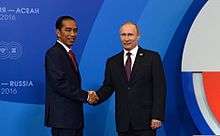
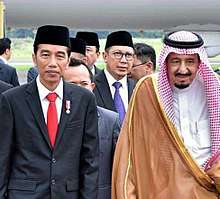
Prior to Jokowi's election, Indonesia's foreign policy under former President Yudhoyono was moulded by the mission statement, "A thousand friends and zero enemies".[110] Jokowi has mandated a three-pronged policy of maintaining Indonesia’s sovereignty, enhancing the protection of Indonesian citizens, and intensifying economic diplomacy.[13]
Jokowi aspires Indonesia to become a global maritime power, (Indonesian: poros maritim dunia or global maritime axis). He sees the sea would have an increasingly important role in Indonesia's future, and that as a maritime country, Indonesia must assert itself as a force between the two oceans: the Indian Ocean and the Pacific Ocean. The five pillars of this maritime-axis doctrine are rebuilding Indonesia's maritime culture, maintaining and managing marine resources, developing maritime infrastructure and connectivity as well as developing the shipping industry and maritime tourism, inviting other nations to cooperate in the marine field and eliminate the source of conflicts at sea, and developing maritime defense forces.[111] As part of this vision, Jokowi has adopted a tougher stance on illegal fishing.[112] He stated that Jakarta can no longer tolerate a situation where over 5,000 ships operate illegally in its waters every day, making a mockery out of Indonesian sovereignty and resulting in annual losses of over $20 billion.[113][114]
On the territorial disputes in the South China Sea, particularly in the Natuna Islands where China's nine-dash line intercepts Indonesian EEZ claims, Jokowi stated that "there will be no compromise on sovereignty",[115] and renamed Indonesia's section of the waters in the South China Sea as "North Natuna Sea".[116] In June 2016, he held a cabinet meeting off the islands aboard an Indonesian Navy corvette, calling to step up maritime patrols in the area.[117]
In the Muslim world, Jokowi released a statement calling for the Muslim leaders at the Organisation of Islamic Cooperation summit meeting in Jakarta to unite in reconciliation and push for Palestinian independence.[118] Under Jokowi, Indonesia's foreign Minister has visited Palestine, but refused entreaties to establish bilateral diplomatic relations with Israel.[119] Jokowi also condemned the persecution of Rohingya Muslims in Myanmar and oversaw the departure of four Indonesian Air Force transport planes with 34 tons of relief supplies for Rohingya refugees in Bangladesh.[120][121]
Human rights
.jpg)
Judicial executions in Indonesia are carried out pursuant to a Presidential Decree following a death sentence imposed by a trial court.[122] Jokowi has stated that he refused to grant any clemency for drug offenders facing execution, and argued that Indonesia was in a state of emergency over drug-related crimes, citing statistics Jakarta Globe reported to be faulty.[123][124] This stance drew criticism not only as it could harm Indonesia's foreign relations with the native countries of the condemned convicts,[125] but also because it imperils Indonesia's own citizens facing the death penalty abroad.[126][127]
After multiple executions in 2015, Australia, Brazil and the Netherlands recalled their ambassadors from Indonesia,[15][128] Australia reduced its foreign aid to Indonesia by nearly half,[129] and Amnesty International issued a condemnation saying they showed a "complete disregard for due process and human rights safeguards.".[130] Former Indonesian constitutional court chief justice Jimly Asshiddiqie, who was a key player in the anti-death penalty lobby in Jakarta, said the push for the execution of Australians Myuran Sukumaran and Andrew Chan had come from Jokowi personally,[131] with the Sydney Morning Herald reporting that Jokowi did not have or read related documents when he refused their clemency requests.[132] In the same year, Jokowi granted Frenchman Serge Atlaoui and Filipino Mary Jane Veloso temporary reprieves due to pending legal appeals.[132] As of 2017, around 260 people remain on death row in Indonesia.[133]
In early 2016, his administration proposed a new anti-terrorism law to replace the previous one made in 2003. Following the Surabaya bombings of 2018, the worst terrorist attack on Indonesian soil since the 2002 Bali bombings, the controversial bill passed, allowing the Indonesian National Armed Forces to participate in counter-terrorism activities given presidential approval and police requests.[134] The law also allowed extended detention of terrorism suspects, and permitted the use of wiretapping without initial court approval.[135] Jokowi himself threatened to issue a replacement law (Perppu) if the bill did not pass the parliament by June that year.[136] He also supported a controversial 2017 bill on mass organizations, which upon passing saw the Indonesian branch of the Hizb ut-Tahrir being disbanded. He stated that the law was a necessity to defend the national ideology Pancasila.[137]
Political actions
He quickly came under fire from his own political party for other policy weakness and one lawmaker said he should be impeached.[138] On 9 April 2015 during PDI-P congress, his party's chair, former President Megawati Sukarnoputri, alluded to him as a functionary. Megawati noted the mechanism of presidential election is that a presidential candidate should be nominated by a political party, as a hint that Jokowi presidential position was owed to his PDI-P nomination; thus implying that it is natural for the president to carry out the Party's political policy line.[139][140] Several months prior, Megawati and Jokowi had disputed over the appointment of a new police chief, with Megawati supporting her former adjutant Budi Gunawan while Jokowi supported Badrodin Haiti.[141][142][143]
The first year of Jokowi's administration saw him controlling a minority government, until Golkar, the second largest party in the People's Representative Council, switched from opposition to government. Jokowi denied accusations of having interfered with Golkar's internal affairs, although admitted that Luhut Pandjaitan may have influenced the change.[141] His cabinet's Minister of Industry Airlangga Hartarto was elected chairman of Golkar in 2018.[144] The National Mandate Party had also switched sides beforehand, but later returned to becoming opposition in 2018.[145][146]
Other domestic policies
Widodo targeted to streamline land certification across the country, aiming to completely distribute certificates of land ownership across the country. This involved increasing the issuing rate of certificates from around 500,000 to several million annually.[147][148]
Second presidential candidacy
In 2018, Widodo announced that he would run for re-election in the 2019 presidential election. His vice president Jusuf Kalla was not seen as eligible for another term because of the term limits set for the positions of president and vice-president. (Jusuf Kalla had already served a five-year term as vice-president Yudhoyono from 2004 to 2009.) Speculation as to who Jokowi might select as his running mate focused on several candidates including Mahfud MD, a former defence minister and chief justice of the Constitutional Court.
On 9 August 2018, in a surprise move, Widodo announced that Ma'ruf Amin would be his running mate. Mahfud had been reported to be preparing himself to become Jokowi's vice presidential candidate but, following a push by several constituent parties of Widodo's governing coalition and influential Islamic figures, Ma'ruf was selected instead.[149] Explaining his decision, Jokowi referred to Ma'ruf's extensive experience in government and religious affairs.[150]
Family and personal life
Jokowi married his wife Iriana in 1986. The couple have three children. Their first son, Gibran Rakabuming (born 1 October 1987) runs a catering and wedding-planning business in Surakarta; he studied abroad in Sydney and Singapore (at the Management Development Institute of Singapore, MDIS). On 11 June 2015, he married Selvi Ananda (born 9 January 1989), a former beauty pageant winner. Their only daughter, Kahiyang Ayu was born on 20 April 1991. She completed an undergraduate degree in food technology at the state-owned Sebelas Maret University in Surakarta. She married Bobby Nasution, a Bataknese businessman on 8 November 2017.[151][152] Their last son, Kaesang Pangarep was born on 25 December 1994 and like his elder brother completed his high school years in ACS International, Singapore.[153] Jokowi has two grandchildren, born in 2016 and 2018 from Gibran and Kahiyang, respectively. Gibran's son, Jan Ethes Srinarendra, was born on 10 March; Kahiyang gave birth to a baby girl named Sedah Mirah Nasution on 1 August.[154]
Jokowi has been described as "Muslim but broadly secular in his outlook".[155]
Interest in rock music
According to The Economist, Jokowi "has a penchant for loud rock music" and owned a bass guitar signed by Robert Trujillo of heavy metal band Metallica, that was confiscated by the anti-corruption commission, KPK.[156] He is also a fan of Lamb of God, Led Zeppelin and Napalm Death. On 2 November 2013, while he was the Governor of Jakarta, he was seen in the rock festival Rock in Solo in casual dress.[157] In November 2017, Danish Prime Minister Lars Løkke Rasmussen, who was on an official visit to Jakarta, gave Jokowi a Metallica Master of Puppets vinyl box set as a diplomatic gift. It was signed by the band's drummer and co-founder, Lars Ulrich, a Danish native.[158] In accordance to his policy of transparency, Widodo paid 11 million rupiah ($800) out of his personal funds to claim the record, which had been declared a state asset in order to avoid accusations of corruption.[159]
Awards and honours
- National honours

- Star of Service Rank of Utama – 2011[160]

- Foreign honours
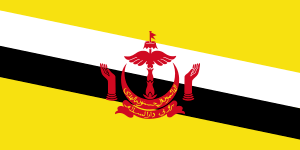



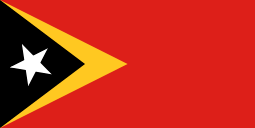



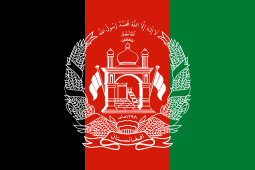
- Medal of Ghazi Amanullah - 29 January 2018[166]
- Other
2008: Listed by Tempo as one of the 'Top 10 Indonesian Mayors of 2008'.[167]
2012: Ranked 3rd at the 2012 World Mayor Prize for "transforming a crime-ridden city into a regional center for art and culture and an attractive city to tourists".[168]
2013: Listed as one of "The Leading Global Thinkers of 2013" in Foreign Policy magazine. In February 2013 he was nominated as the global mayor of the month by the City Mayors Foundation, based in London.[169]
2014: Listed by Fortune as one of 'The World's 50 Greatest Leaders'.[170]
2016-2017: List by "The Muslim 500" as one of the most influential Muslims in the world, which ranked 11 in 2016 and 13 in 2017.[171][172]
See also
References
- 1 2 "Kisah Mulyono Menjadi Joko Widodo".
- ↑ Tempo.Co. "Asal Mula Basuki Tjahaja Dipanggil Ahok | balaikota | tempo.co". Tempo News. Retrieved 21 October 2016.
- ↑ "Naik Kopaja, Jokowi – Ahok Daftar Jadi Cagub DKI" (in Indonesian). Tempo. 19 March 2012.
- 1 2 "Editorial: Jokowi's real battle". The Jakarta Post. 22 September 2012. Retrieved 3 December 2016.
- ↑ Banyan (21 January 2014). "No ordinary Jokowi". The Economist. Retrieved 31 August 2017.
- ↑ "Indonesia's rock governor". www.aljazeera.com. Al Jazeera. 4 April 2014. Retrieved 31 August 2017.
- ↑ 'Governor of Jakarta Receives His Party’s Nod for President', The New York Times, 14 March 2014.
- ↑ "Jakarta governor Widodo wins Indonesian presidential election". Indonesia News.Net. Retrieved 23 July 2014.
- ↑ Thatcher, Jonathan; Kapoor, Kanupriya (23 July 2014). "Indonesian president-elect Jokowi calls for unity after bitter election". Reuters. Retrieved 31 August 2017.
- ↑ hermes (27 January 2018). "Jokowi chasing $196b to fund 5-year infrastructure plan". The Straits Times. Retrieved 22 April 2018.
- ↑ Setiaji, Hidayat. "Late rush to join Indonesia tax amnesty after $360 billion declared". Reuters. Retrieved 9 October 2018.
- ↑ Indrawati, Sri Mulyani. "Tax Amnesty Program Indonesia Ended, What Are the Results?". Indonesia Investments. Retrieved 22 April 2018.
- 1 2 "The Trouble With Indonesia's Foreign Policy Priorities Under Jokowi". The Diplomat. Retrieved 25 July 2015.
- ↑ Chan, Francis (2 April 2017). "Indonesia blows up and sinks another 81 fishing boats for poaching". Straits Times. Retrieved 31 August 2017.
- 1 2 "Bali Nine executions, Indonesia responds to Australia withdrawing Ambassador".
- ↑ Halim, Haeril (22 July 2017). "Jokowi orders police to gun down foreign drug traffickers". The Jakarta Post. Retrieved 31 August 2017.
- ↑ Post, The Jakarta. "BREAKING: PDI-P officially endorses Jokowi for 2019 presidential election".
- ↑ Anggriawan, Fiddy (20 September 2012). "Jokowi Kenalkan Adik dan Ibu Kandungnya ke Publik". Okezone.com. Archived from the original on 20 September 2012. Retrieved 29 March 2014.
- ↑ Hasyim Widhiarto and Kusumari Ayuningtyas, 'Furniture business propels Jokowi's path to prominence', The Jakarta Post, 30 June 2014.
- ↑ Dihadapan Pimpinan Muhammadiyah, Jokowi Bantah Anti Islam diakses dari situs Metro TV News pada tanggal 26 May 2014.
- ↑ "Jokowi Anak Tergusur Mau Jadi Gubernur". Beritasatu.com. 11 April 2012. Retrieved 29 March 2014.
- 1 2 Segu, Vinsensiu (16 July 2012). "Dari Bantaran Kali Menuju DKI-1". Inilah.com. Retrieved 29 March 2014.
- ↑ "Jokowi Kecil, Rumah Digusur, Tiga Kali Pindah Kontrakan". Tribunnews. 21 September 2012. Retrieved 29 March 2014.
- ↑ Alim, Abdul (22 September 2012). "Ratusan siswa SD Jokowi gelar aksi syukur". SINDOnews.com (in Indonesian). Retrieved 21 July 2018.
- ↑ Sunaryo, Arie (10 August 2013). "Sejak SMP, Jokowi sudah dikenal pendiam tapi pintar". Merdeka.com. Retrieved 29 March 2014.
- ↑ "Gagal Masuk SMA Favorit, Jokowi Sakit Tipus dan Pendiam". Tribunnews. 23 September 2012. Retrieved 29 March 2014.
- 1 2 Samah, Kristin; Susanti, Fransisca Ria (2014). Saya Sujiatmi, Ibunda Jokowi (in Indonesian). Gramedia Pustaka Utama. ISBN 9786020304441.
- ↑ Iqbal, M. (2 March 2016). "Jokowi Ajak Makan Siang Para Sahabat Lamanya Saat Bekerja di Aceh". detikNews (in Indonesian). Retrieved 13 October 2018.
- ↑ "How a French connection gave Indonesia 'Jokowi'". The Jakarta Post. 20 October 2014.
- 1 2 "Bagaimana Jokowi Bangun Pabrik Mebel Rakabu yang Terbakar?". Tempo (in Indonesian). 20 April 2016. Retrieved 13 October 2018.
- ↑ "Jokowi Sudah Lama Bekerjasama dengan Luhut Panjaitan". rmol.co (in Indonesian). 30 March 2014. Retrieved 28 September 2018.
- ↑ Santoso, Teguh Budi (20 September 2018). "Mengapa Publik (Terpaksa) Harus Menerima Paket Jokowi-Ma'ruf Amin?". tirto.id (in Indonesian). Retrieved 28 September 2018.
- ↑ "Sejarah Pemerintahan". Pemerintah Kota Surakarta. Archived from the original on 23 January 2017. Retrieved 4 November 2017.
- ↑ "Begini Perjalanan Politik Jokowi, Si 'Capres Kerempeng'". detikNews (in Indonesian). 20 October 2014. Retrieved 13 October 2018.
- 1 2 3 Cahyadi Indrananto (June 2012) Pemimpin Daerah Sebagai Agen: Dramaturgi dalam Komunikasi Politik Walikota Solo Joko Widodo / Local Leaders as Agents: Dramaturgy on Political Communications of City Mayor Joko Widodo of Solo, Postgraduate Thesis.
- ↑ Joko Wididi Raih Penghargaan Best City Award Asia Tenggara – Best City Award Delgosea Joko Widodo penataan PKL walikota solo
- ↑ Sita W. Dewi and Kusumasari Ayuningtyas, 'Poor stagnate while city thrives', The Jakarta Post, 18 November 2013.
- ↑ Kusumasari Ayuningtyas, 'Surakarta mayor uses car made by vocational school students' Archived 24 December 2013 at the Wayback Machine., The Jakarta Post, 3 January 2012.
- ↑ Kusumasari Ayuningtyas, 'Residents of Surakarta accompany mayor to pay PLN', The Jakarta Post, 4 January 2012.
- ↑ "Kemenangan Fenomenal Jokowi-Rudy". KOMPAS (in Indonesian). 21 May 2010. Retrieved 3 August 2018.
- ↑ See the several reports by Sita W. Dewi and Kusumasari Ayuningtyas: 'Jokowi's star appeal: Making hay while sun shines', The Jakarta Post, 18 November 2013; 'The inner circle', The Jakarta Post, 19 November 2013; Sita W. Dewi, 'Man of the house, man of the moment', The Jakarta Post, 20 November 2013.
- ↑ Editorial: Start working, Jokowi', 22 January 2013, The Jakarta Post.
- ↑ "Leading and shaping a unified, high performing APS". Australian Public Service Commission. Archived from the original on 25 July 2015. Retrieved 24 July 2015.
- ↑ Dewi Sendhikasari D. Lelang Jabatan Camat dan Lurah di DKI Jakarta Archived 29 October 2013 at the Wayback Machine.. diakses dari situs Berkas DPR pada tanggal 23 October 2013
- ↑ ngapocak (20 June 2013). "Jokowi (2013)". IMDb.
- ↑ 'Tak Ada Izin, Jokowi Keberatan Film "Jokowi" ', Kompas, 22 May 2013.
- ↑ 'For all citizens or only the poor?', The Jakarta Post, 22 December 2013.
- ↑ Tom McCawley (November 2013) "Overdue Antidote" Archived 24 December 2013 at the Wayback Machine., Development Asia, Asian Development Bank.
- ↑ '"Jokowi-care" a pilot project for upcoming national health plan', The Jakarta Post, 22 December 2013.
- ↑ 'A report card for Jakarta's healthcare program', The Jakarta Post, 22 December 2013.
- ↑ Kartu Jakarta Pintar Diluncurkan. Antara. 15 March 2014
- ↑ Dipimpin Jokowi, Pendapatan DKI naik Rp 31 Triliun dalam Setahun. bisniskeuangan.kompas.com. 17 March 2014
- ↑ Pernyataan PAD 72 Triliun diralat sebagai APBD, bukan PAD oleh Kepala Dinas Pelayanan Pajak DKI Jakarta Iwan Setiawandi
- 1 2 "Menlu Inggris dukung transparansi Jokowi". BBC. 28 January 2014. Retrieved 15 March 2014.
- ↑ Jordan, Ray (14 March 2013). "Transparansi Jokowi, Ini Dia Poster APBD 2013". Detik. Retrieved 15 March 2014.
- ↑ Juwari, Ahmad (14 November 2012). "Ini Alasan Jokowi Setuju Rapat Pemprov DKI Ditampilkan di Youtube". Detik. Retrieved 15 March 2014.
- ↑ Jokowi Siapkan Hadiah Mobil Bagi Pembeli di Blok G. Antara.19 March 2014
- ↑ Jokowi Tahun Ini Renovasi Empat Pasar Tradisional. merdeka. 19 March 2014
- ↑ Bosan Lihat Jokowi Mana Ahok Nih?. Kompas. 19 March 2014
- ↑ Jokowi Resmikan Lima Pasar Tradisional. Republika. 19 March 2014
- ↑ Diplomasi Makan Siang Jokowi dan Warga Waduk Pluit Berlanjut Pekan Depan. Detik. 22 March 2014
- ↑ Perdana Menteri Belanda Nilai Jokowi Pemimpin Hebat. merdeka. 15 March 2014
- ↑ BPBD: Berkat Kerja Jokowi Banjir 2014 Tak Separah 2013. Liputan6. 15 March 2014
- ↑ "Proyek Pembangunan MRT Jakarta Resmi Dimulai". VOA Indonesia. 10 October 2013. Retrieved 15 March 2014.
- ↑ Syailendra (16 October 2013). "Jokowi Resmikan Monorel Jalur Hijau". Tempo. Retrieved 15 March 2014.
- ↑ Raditya Margi (9 September 2015). "Jokowi kicks off LRT construction". The Jakarta Post. Jakarta. Retrieved 21 September 2015.
- ↑ Jokowi and Prabowo both claim victory in early Indonesian election results . The Guardian. 10 July 2014. Retrieved 22 July 2014
- 1 2 Yolanda Ryan Armindya (22 July 2014). "KPU Postpones Election Results Announcement". Tempo. Archived from the original on 22 July 2014. Retrieved 22 July 2014.
- ↑ Novrida Manurung, Rieka Rahadiana and Yoga Rusmana (22 July 2014). "Widodo Heads for Indonesia Win as Prabowo Withdraws From Count". Bloomberg. Retrieved 22 July 2014.
- ↑ "Indonesia elections: Jakarta governor 'Jokowi' wins but rival rejects final results". The Daily Telegraph. Archived from the original on 22 July 2014. Retrieved 22 July 2014.
- ↑ "Prabowo camp says PKS tally more accurate than KPU's". The Jakarta Post. 22 June 2014. Archived from the original on 22 July 2014. Retrieved 22 July 2014.
- 1 2 Joe Cochrane (22 July 2014). "Joko Widodo, Populist Governor, Is Named Winner in Indonesian Presidential Vote". The New York Times. Archived from the original on 22 July 2014. Retrieved 22 July 2014.
- ↑ "Jokowi Announces Names of Cabinet Members". Tempo. 26 October 2014. Retrieved 12 October 2018.
- ↑ "Jokowi praised for record number of women in Cabinet". The Straits Times. 31 October 2014. Retrieved 12 October 2018.
- ↑ Akuntono, Indra (23 October 2014). "Ini Nama Kementerian yang Berubah dalam Kabinet Jokowi-JK". KOMPAS (in Indonesian). Retrieved 12 October 2018.
- ↑ Cook, Erin (27 January 2018). "What Does Indonesia's New Cabinet Reshuffle Mean for Jokowi's Future?". The Diplomat. Retrieved 12 October 2018.
- ↑ Brummitt, Chris (4 May 2015). "Wakeup Call for President Widodo". Bloomberg L.P. Retrieved 25 July 2015.
- ↑ "Indonesian economic growth continues decline as Q2 figures show drop to 2009 levels". Australian Broadcasting Corporation. 7 August 2015. Retrieved 7 August 2015.
- ↑ Sheridan, Greg (25 June 2015). "Indonesia's Jokowi presidency is becoming a desperate mess". The Australian. Newscorp. Retrieved 25 July 2015.
- ↑ "Jokowi Heads to 2018 With Backing of Stronger Indonesian Economy". Bloomberg.com. 27 December 2017. Retrieved 4 April 2018.
- ↑ "Rupiah slides past 14000 per dollar". The Jakarta Post. 25 August 2015. Retrieved 1 September 2015.
- ↑ "USD IDR Cross Rates". Retrieved 10 October 2015.
- ↑ Baskoro, Faisal Maliki (31 December 2016). "Sepanjang 2016, Rupiah Terapresiasi 2,3%". BeritaSatu.com (in Indonesian). Retrieved 6 March 2017.
- ↑ "Indonesia's Rupiah Breaches 14,000 as GDP Growth Misses Estimate". Bloomberg L.P. 7 May 2018. Retrieved 15 May 2018.
- ↑ Kiesche, Liz (5 September 2018). "Indonesian rupiah breaches 15,000 per U.S. dollar then eases off". Seeking Alpha. Retrieved 18 September 2018.
- ↑ Samosir, Agnes (21 July 2015). "News Summary". ANU Indonesia Project. Retrieved 25 July 2015.
- 1 2 "Indonesia fuel prices rocket by 44% sparking protests". BBC. BBC. 22 June 2013. Retrieved 23 July 2015.
- ↑ Irviani, Koman (28 August 2014). "Jokowi fails to persuade Yudhoyono on fuel subsidy". Jakarta Post. Retrieved 23 July 2015.
- ↑ "Indonesia—Moving in a New Direction". IMF Survey. 19 March 2015. Retrieved 23 July 2015.
- ↑ Fitri Wulandari; Eko Listiyorini; Sharon Chen (31 December 2014). "Widodo Makes Biggest Change to Indonesia Fuel Subsidies: Economy". Bloomberg. Retrieved 18 July 2015.
- ↑ Dion Bisara; Muhamad Al Azhari (31 December 2014). "Jokowi Eyes Infrastructure Focus With Fuel Subsidy Cut". Jakarta Globe. Retrieved 18 November 2014.
- ↑ "Jokowi worries 'big forces' hampering govt projects, policies". Jakarta Post. 3 August 2015. Retrieved 3 August 2015.
- ↑ "Government achieves 2017 single-fuel price target: Minister". Antara News. 8 January 2018. Retrieved 18 July 2018.
- ↑ Ayomi Amindoni (23 March 2016). "Jokowi policy attracts infrastructure-based mutual funds". The Jakarta Post. Retrieved 18 April 2016.
- ↑ Salna, Kalris (26 January 2018). "Indonesia Needs $157 Billion for Infrastructure Plan". Bloomberg. Retrieved 18 July 2018.
- ↑ "Indonesia to award fast train contract to China - Japanese embassy official". Reuters. 29 September 2015. Retrieved 1 October 2015.
- ↑ "Indonesia awards multi-billion-dollar railway project to China over Japan". ABC. 30 September 2015. Retrieved 1 October 2015.
- ↑ Robin Harding in Tokyo; Avantika Chilkoti in Jakarta; Tom Mitchell in Beijing (1 October 2015). "Japan cries foul after Indonesia awards rail contract to China". Financial Times. Retrieved 1 October 2015.
- ↑ Otto, Ben (3 February 2016). "Indonesia's High-Speed Rail Plan Goes Off the Tracks". Wall Street Journal. Retrieved 13 June 2016.
- ↑ McBeth, John (2 October 2017). "Rough road ahead for powder keg Papua". Asia Times. Retrieved 18 July 2018.
- ↑ "Jokowi optimistic Trans Java toll road fully completed in 2019 - ANTARA News". Antara News. 23 June 2018. Retrieved 18 July 2018.
- ↑ "Kereta Api Trans Sulawesi Beroperasi April 2018". Okezone (in Indonesian). 7 March 2017. Retrieved 18 July 2018.
- ↑ "Groundbreaking Trans-Sumatra Toll Road; Infrastructure Projects Indonesia". Indonesia Investments. 30 April 2015. Retrieved 27 September 2018.
- ↑ "Indonesia sneaks up on Singapore with flurry of port projects". Nikkei Asian Review. Retrieved 18 July 2018.
- ↑ "Jokowi Seeks Investors for Indonesia's Airports to Curb Deficit". Bloomberg. 9 November 2016. Retrieved 18 July 2018.
- ↑ "Indonesia Tries Rural Development - Asia Sentinel". Asia Sentinel. 20 March 2018. Retrieved 18 July 2018.
- ↑ "New village scheme risks quality". The Jakarta Post. 15 December 2017. Retrieved 18 July 2018.
- ↑ Kusuma, Hendra (14 May 2018). "Jokowi Kucurkan Rp 187 Triliun untuk Program Dana Desa". Detik (in Indonesian). Retrieved 18 July 2018.
- ↑ "Economic nationalism is back in Indonesia as election approaches". The Straits Times. 17 September 2018. Retrieved 18 September 2018.
- ↑ "Indonesia's New Foreign Policy - 'Thousand friends- zero enemy'". Institute for Defence Studies and Analyses. Retrieved 25 July 2015.
- ↑ Rendi A. Witular (13 November 2014). "Jokowi launches maritime doctrine to the world". The Jakarta Post. Retrieved 14 April 2016.
- ↑ Chan, Francis (2 April 2017). "Indonesia blows up and sinks another 81 fishing boats for poaching". The Straits Times. Retrieved 10 October 2018.
- ↑ Prashanth Parameswaran (13 January 2015). "Explaining Indonesia's 'Sink The Vessels' Policy Under Jokowi". The Diplomat. Retrieved 18 July 2015.
- ↑ "Terapi kejut Jokowi bagi pencuri ikan asing". Okezone.com. 10 December 2014. Retrieved 15 April 2018.
- ↑ "No compromise on sovereignty over Natuna Islands despite China claims: Indonesia's Jokowi". The Straits Times. 5 November 2016. Retrieved 21 August 2018.
- ↑ Allard, Tom (14 July 2017). "Asserting sovereignty, Indonesia renames part of South China Sea". Reuters U.K. Retrieved 21 August 2018.
- ↑ Kapoor, Kanupriya (22 June 2016). "Indonesia president visits islands on warship, makes point to China". Reuters. Retrieved 21 August 2018.
- ↑ Liza Yosephine (7 March 2016). "Jokowi calls for unity for reconciliation in Palestine". The Jakarta Post. Retrieved 7 March 2016.
- ↑ "Indonesia rejects Israel's latest call for bilateral relations". 31 March 2016. Retrieved 18 April 2016.
- ↑ "The Latest: Indonesia sends 34 tons of aid for Rohingya". ABC News. Retrieved 2017-09-14.
- ↑ "Indonesian President Jokowi deplores violence against Rohingya". Channel NewsAsia. Retrieved 2017-09-14.
- ↑ "Penetapan Presiden Nomor 2 Tahun 1964". Pidana. 17 April 1964. Retrieved 23 July 2015.
- ↑ Ina Parlina; Margareth S. Aritonang; Severianus Endi (21 January 2015). "Jokowi refuses to budge on clemency issue". The Jakarta Post. Retrieved 6 July 2015.
- ↑ Claudia, Stoicescu (6 February 2015). "Indonesia's Executions of Drug Convicts Based on Faulty Stats". Jakarta Globe.
- ↑ Peter Alford; Brendan Nicholson (5 March 2015). "Diplomacy doomed to fail Andrew Chan and Myuran Sukumaran". The Australian. Retrieved 23 July 2015.
- ↑ Sarah Gill (5 March 2015). "Capital punishment — Jokowi's twin policy positions". Jakarta Post. Retrieved 8 August 2015.
- ↑ "Indonesia's Death Penalty Hypocrisy". 3 March 2015. Retrieved 2 April 2016.
- ↑ Arshad, Arlina (19 January 2015). "Brazil and the Netherlands recall ambassadors after Indonesian executions". Sydney Morning Herald.
- ↑ "Federal budget 2015: Foreign aid to Indonesia cut by nearly half, Africa aid down 70 per cent". Sydney Morning Herald. Fairfax Media. 13 May 2015. Retrieved 23 July 2015.
- ↑ "Indonesia executes drug smugglers by firing squad". Al Jazeera. Al Jazeera. 29 April 2015.
- ↑ Bachelard, Michael (12 August 2015). "Schapelle Corby made it harder to save Andrew Chan and Myuran Sukumaran". Fairfax Media. Retrieved 12 August 2015.
- 1 2 Bachelard, Michael (19 February 2015). "Bali nine executions: Indonesia's President did not have all the documents when he refused clemency". Sydney Morning Herald. Fairfax Media.
- ↑ "Death Penalty Worldwide". Cornell University Law School. Retrieved 12 October 2018.
- ↑ Diela, Tabita (25 May 2018). "Indonesia toughens up anti-terror laws days after worst attack in years". Reuters. Retrieved 31 July 2018.
- ↑ Wahyudi, Soeriaatmadja (25 May 2018). "Indonesia's anti-terror Bill to extend detention". The Straits Times. Retrieved 12 October 2018.
- ↑ Ihsanuddin (14 May 2018). "Jika pada Juni RUU Antiterorisme Belum Selesai, Jokowi Terbitkan Perppu". KOMPAS (in Indonesian). Retrieved 31 July 2018.
- ↑ Stefanie, Christie (26 October 2017). "Jokowi Tegaskan UU Ormas untuk Lindungi Pancasila". CNN Indonesia (in Indonesian). Retrieved 27 September 2018.
- ↑ Aritonang, Margareth (28 January 2015). "PDI-P lawmaker slams Jokowi's policies". Jakarta Post.
- ↑ Ging Ginanjar (9 April 2015). "Megawati tegaskan posisi PDIP atas Pemerintah Jokowi". BBC Indonesia (in Indonesian). Retrieved 6 July 2015.
- ↑ Hartcher, Peter (28 April 2015). "Indonesian President Widodo under corrupt thumb of Megawati". The Sydney Morning Herald. Retrieved 14 April 2017.
- 1 2 Suzuki, Jun (9 June 2016). "Widodo gets second wind for reforms". Nikkei Asian Review. Retrieved 12 October 2018.
- ↑ "Cerita Syafii Soal Kenapa Megawati Kukuh Sokong Budi Gunawan". Tempo (in Indonesian). 4 March 2015. Retrieved 12 October 2018.
- ↑ "Budi Gunawan Batal Dilantik, Ternyata Ini Reaksi Megawati". Tempo (in Indonesian). 22 February 2015. Retrieved 12 October 2018.
- ↑ McBeth, John (18 January 2018). "Can this man save Indonesia's Golkar?". Asia Times. Retrieved 12 October 2018.
- ↑ "PAN joins the ruling collation". The Jakarta Post. 2 September 2015. Retrieved 12 October 2018.
- ↑ Putri, Parastiti Kharisma; Ramdhani, Jabbar (10 August 2018). "PAN Oposisi, Menteri PAN-RB Bakal Mundur?". detiknews (in Indonesian). Retrieved 12 October 2018.
- ↑ "Indonesian president hands over land certificates in Papua". Radio New Zealand. 12 April 2018. Retrieved 31 July 2018.
- ↑ "Government to complete land certificate distribution by 2025: Jokowi". Antara News. 29 December 2017. Retrieved 31 July 2018.
- ↑ Marguerite Apra Sapiie, 'Jokowi may pick Mahfud MD as running mate', The Jakarta Post, 9 August 2018.
- ↑ Sita W. Dewi, 'Who is Ma'ruf Amin, Jokowi's running mate?', The Jakarta Post, 9 August 2018.
- ↑ hermesauto (8 November 2017). "Wedding of Joko Widodo's daughter attended by 'Who's Who' of Indonesia".
- ↑ Post, The Jakarta. "Jokowi's daughter's wedding procession starts Monday".
- ↑ Widhiarto, Hashim; Dewi, Sita W. (20 October 2014). "First Family stays cool, won't parade wealth". The Jakarta Post. Retrieved 14 April 2017.
- ↑ "Jokowi, Iriana welcome their second grandchild". The Jakarta Post. 1 August 2018. Retrieved 27 September 2018.
- ↑ "Indonesian politics are becoming less predictable". The Economist. 5 October 2017.
- ↑ 'Banyan: Mr Joko goes to Jakarta', The Economist, 8 June 2013.
- ↑ Jokowi Nonton Konser Rock hingga ke Solo. regional.kompas.com. 3 November 2013
- ↑ Maine, Samantha (29 November 2017). "Danish Prime Minister gives gift of Metallica boxset to Indonesian President". NME. Retrieved 30 November 2017.
- ↑ Meixler, Eli (23 February 2018). "Indonesia's President Paid $800 to Keep a Limited-Edition Metallica Album". Time. Retrieved 23 February 2018.
- ↑ "Inilah 30 Nama Penerima Bintang Tanda Jasa 2011". Tempo (in Indonesian). 12 August 2011. Retrieved 27 September 2018.
- ↑ Piri, Sally (8 February 2015). "HM confers state decoration on Indonesian President". The Brunei Times. Archived from the original on 8 February 2015. Retrieved 8 February 2015.
- ↑ "Jokowi meets Indonesian migrant workers in Brunei". Thai PBS. 9 February 2015. Retrieved 14 April 2017.
- ↑ "Jokowi Receives King Abdul Azis Medal". 12 September 2015. Retrieved 12 September 2015.
- ↑ "President Jokowi Receives Highest Medal of Honour from Timor Leste". 26 January 2016. Retrieved 26 January 2016.
- ↑ "Jokowi bestows highest medal to Swedish king". 22 May 2017. Retrieved 19 June 2017.
- ↑ Sani, Ahmad Faiz Ibnu (30 January 2018). "Jokowi Receives Ghazi Amanullah Medal from Afghan President". Tempo. Retrieved 30 January 2018.
- ↑ "Sedikit Orang Baik di Republik yang Luas". Tempo (in Indonesian). 22 December 2008. Retrieved 27 September 2018.
- ↑ "World Mayor: The 2012 results". www.worldmayor.com. Retrieved 22 August 2018.
- ↑ Brian Baker (1 February 2013) Mayor of the Month for February 2013 – Joko Widodo (Jokowi) Governor of Jakarta. citymayors.com
- ↑ "Fortune ranks the World’s 50 Greatest Leaders" Archived 23 March 2014 at the Wayback Machine.. Fortune. 20 March 2014
- ↑ "The Muslim 500". themuslim500.com.
- ↑ http://global.liputan6.com/read/2959339/jokowi-di-peringkat-13-muslim-paling-berpengaruh-di-dunia
Further reading
| Wikimedia Commons has media related to Joko Widodo. |
- Majeed, Rushda (2012). "The City With a Short Fuse." Foreign Policy. September.
- Majeed, Rushda (2012). "Defusing a Volatile City, Igniting Reforms: Joko Widodo and Surakarta, Indonesia, 2005–2011." Innovations for Successful Societies. Princeton University. Published July.
- McCawley, Peter (2014). Joko Widodo's Indonesia: Possible future paths, Australian Strategic Policy Institute, Canberra.
| Political offices | ||
|---|---|---|
| Preceded by Slamet Suryanto |
Mayor of Surakarta 2005–2012 |
Succeeded by F. X. Hadi Rudyatmo |
| Preceded by Fauzi Bowo |
Governor of Jakarta 2012–2014 |
Succeeded by Basuki Tjahaja Purnama |
| Preceded by Susilo Bambang Yudhoyono |
President of Indonesia 2014–present |
Incumbent |
